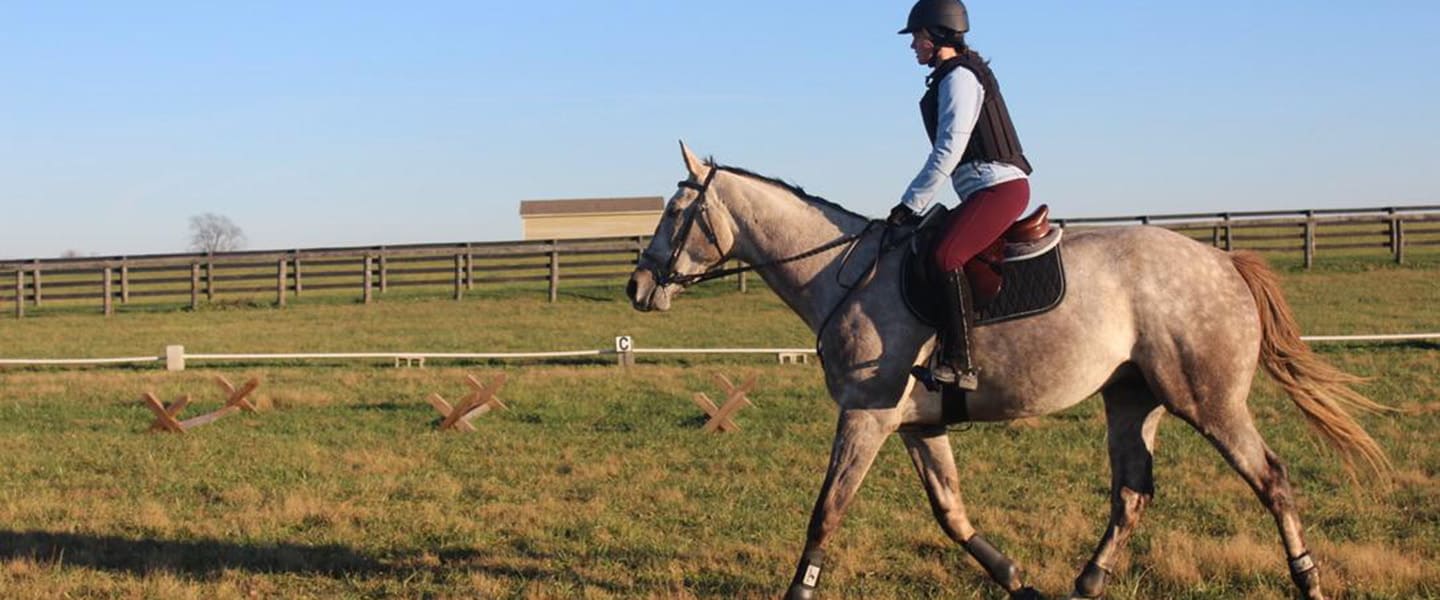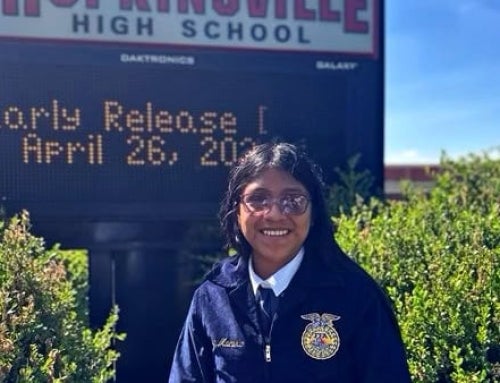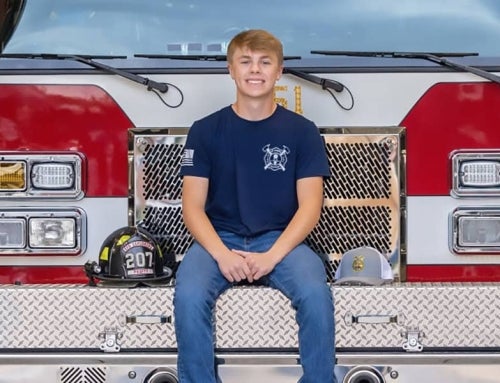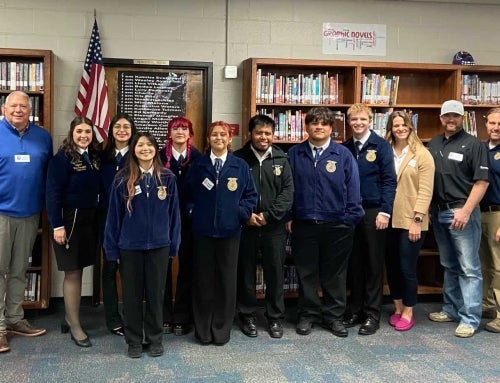Erick Torres started going to the horse stables when he was just eight years old. He tagged along with his dad, a professional horse groom, to help bathe and brush the thoroughbreds.
The experience convinced Torres, now 18, that he wanted a career working with horses. When he learned that Locust Trace AgriScience Center in Lexington, Ky., had an equine program for high school students, he couldn’t wait to sign up. The program exceeded his expectations.
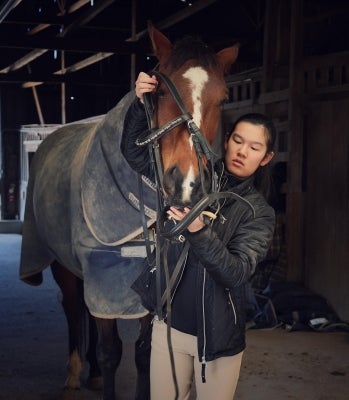
Locust Trace FFA member Lily Crouch
“It was really fast-paced and really fun, and I learned a lot of things,” Torres says. “It gave me a special boost.”
After his 2020 graduation, Torres accepted a job at the iconic Thoroughbred Center in Lexington as a horse groom and set his sights on becoming an equine veterinarian. Torres believes the high school program provided the skills and confidence he needs to take his equine career to the next level.
The equine program has been part of the curriculum since Locust Trace opened its doors in 2011. A new partnership between Fayette County Public Schools and the Kentucky Thoroughbred Association has expanded the offering, making the program available to all high school students attending the career and technical high school in Lexington.
“An equine program just makes sense in the horse capital of the world,” notes Logan Layne, agriculture teacher and FFA advisor at Locust Trace.
Although Lexington is considered the horse capital of the world, many of the students in Fayette County Public Schools have had little interaction with horses. Through the program and membership in the Locust Trace FFA chapter, more than 2,400 students will gain knowledge and exposure to the myriad career possibilities in the equine industry.
“It’s all about exposure,” says Anne DeMott, principal at Locust Trace. “Students might not associate a career in technology with agriculture at all, but if we can let students job shadow or take them to places to see how they could take that interest and combine it with agriculture, those experiences are crucial in building a new generation of agriculturalists.”
Using the Three-Circle Model
Saniyah Smith had no interest in working with horses until she was inadvertently enrolled in the equine program. Now, the Locust Trace senior hopes to study equine science and management in college and pursue a career in equine dentistry or therapy.
“The equine pathway is so hands-on; you’re working with horses every day,” Smith says. “I like being hands-on, seeing and touching the horses and being able to look at the different parts of their bodies and say, ‘Oh, this is what it looks like, this is what it feelslike.’ It’s more fun and you can remember it better than just looking at it on a piece of paper.”
Torres agrees. He often points out different parts of the equine anatomy while bathing and grooming horses – and even shares the information with his dad.
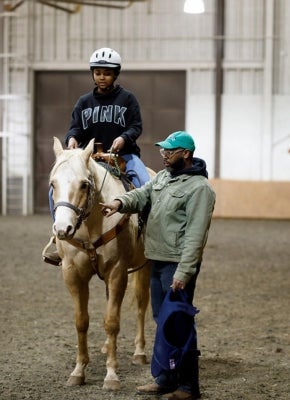
Saniyah Smith receives guidance from equine instructor Jermo Reese.
“He’s really happy that I’m learning lots of things,” Torres explains. “He’s sometimes right next to me when I’m doing equine work, and he’ll say things like, ‘I didn’t know that body part.’ We’re just both learning new things.”
The hands-on learning environment is one of the biggest benefits of the expanded equine program, according to Fallon Jackson, agriculture teacher and FFA advisor at Locust Trace.
FFA members are exposed to each component of the three-circle model, combining premier leadership, personal growth and career success. They use lessons from the classroom during their field trips and volunteer opportunities at 23 participating horse farms around Lexington.
“It’s the partnership with local farms that makes this program stand out,” she says. “Being able to set students up with internships and experiences will put them leaps and bounds ahead of the competition for career opportunities.”
Through the equine program, Smith, 17, has volunteered with the Kentucky Horse Park and the Kentucky Equine Adoption Center. She also spent time teaching students from nearby Nicholasville Elementary School about equine anatomy; the difference between a walk, trot, canter and gallop; and the proper technique for haltering a horse.
“The program’s unique because they give you chances that most kids don’t have,” she says. “I’d never worked with horses, and now I’m taking equine classes. I went from somebody who knew almost nothing about horses to feeling confident talking about horses and going out and volunteering.”
More Than Horsin’ Around
While Locust Trace FFA members often cite spending time with horses as one of the biggest advantages of participating in the equine program, the classes are about more than just horsin’ around.
Several FFA members have used the program as a foundation for their supervised agricultural experiences (SAEs). Layne points to members who have developed SAEs to educate others about the equine industry’s importance in Kentucky.
“I’ve seen students, even from last year to this year, maturing so much because of the responsibilities they took on in the equine program,” he adds. “They are developing the skills they need to be successful in the industry.”
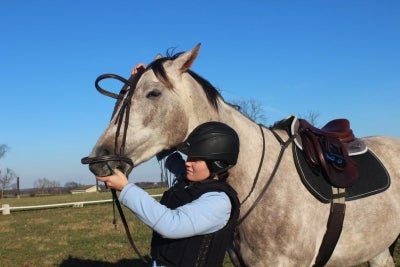
Locust Trace FFA member Kennedy Spriggs works with her off-track Thoroughbred, Pesto.
Lily Crouch has known she wanted to work with horses since she was little. Although she had a lot of experience riding horses and participating in competitions, Crouch, 17, admits she didn’t know much about what happened behind the scenes or potential career pathways that would allow her to work with Thoroughbreds. The equine program at Locust Trace changed that.
“It’s amazing, considering we’re in the middle of Lexington, to have a program for city kids who have the passion and the drive to want to be in the ag industry,” Crouch says.
After she graduates from Locust Trace in 2021, Crouch hopes to double major in education and equine science and management with a minor in animal science. Crouch isn’t sure what career path she’ll pursue, but thanks to her experiences at Locust Trace, she knows her future includes working with horses.
Kentucky horse farms often struggle to hire skilled workers, and they have high hopes that the equine program at Locust Trace will create a school-to-farm employment pipeline that offers opportunities for students from all racial and socioeconomic backgrounds who are often underrepresented in the equine industry. The impact could last for generations.
“The industry has such a need for qualified employees that they’re willing to invest to help create that passion and excitement about horses and, hopefully, drive them to pursue careers in the Thoroughbred industry,” DeMott says. “It speaks volumes that we have an industry that believes in what we’re doing and is willing to wait on a return on their investment.”
Local colleges have taken note, too. Several schools, including Midway University, Bluegrass Community and Technical College and the University of Kentucky, have promised scholarships to select students graduating from the equine program.
Jackson says the program is all about redefining what it means to pursue a career in agriculture, adding, “A lot of city and suburban kids think FFA and agriculture aren’t for them, but, through this program, we can introduce them to opportunities that line up with their interests and flip that script.”
Photography: Courtesy Charlie Crouch, Kennedy Spriggs and Jonathan Palmer/Kentucky State University Land Grant Program

